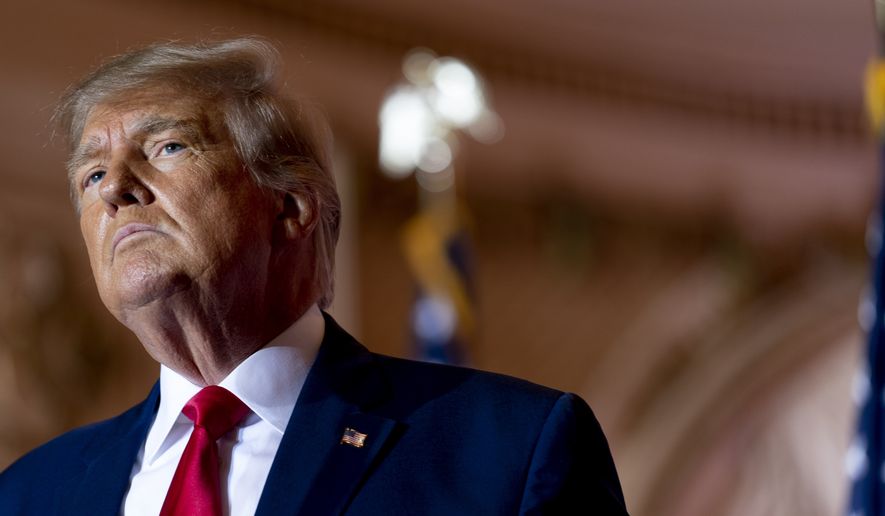Elon Musk on Friday disclosed further details of the FBI’s work with Twitter employees to moderate content in the lead-up to the 2020 presidential election as part of an extended three-part segment of the ongoing “Twitter Files” diving into former President Donald Trump’s ouster from the platform.
Adding to previous revelations of Twitter’s left-wing bent that led to the censorship of conservative viewpoints and the suppression of the Hunter Biden laptop story just weeks before the 2020 presidential election, independent journalist Matt Taibbi promised Twitter users an inside look at what led to Mr. Trump’s ouster in the wake of the Jan. 6, 2021, attack on the U.S. Capitol.
“Whatever your opinion of the decision to remove Trump that day, the internal communications at Twitter between January 6th - January 8th have clear historical import,” Mr. Taibbi wrote in an extended Twitter thread Friday. “Even Twitter’s employees understood in the moment it was a landmark moment in the annals of speech.”
The first segment focused on what Mr. Taibbi calls an “erosion of standards within the company” in the months leading up to the Capitol riot, detailing Twitter employees’ internal debate over censoring election-related content posted by Mr. Trump.
The internal documents revealed in the thread describe what Mr. Taibbi said were “decisions by high-ranking executives to violate their own policies, and more, against the backdrop of ongoing, documented interaction with federal agencies.”
“During this time, executives were also clearly liaising with federal enforcement and intelligence agencies about moderation of election-related content,” Mr. Taibbi wrote. “While we’re still at the start of reviewing the #TwitterFiles, we’re finding out more about these interactions every day.”
Mr. Taibbi reported during the first installment of the Twitter Files — concerning the company’s decision to censor the Hunter Biden laptop story weeks before the election — that he had uncovered no specific evidence pointing to direct communication between federal officials and Twitter employees.
In Friday’s thread, however, he unveiled evidence, including internal chat logs, pointing to “intensified relationships” between federal agencies and Twitter executives.
In one Slack exchange among Twitter employees disclosed in the latest installment, Twitter’s head of trust and safety Yoel Roth alluded to disguising his interactions with federal officials as generic meetings on his public calendar.
“I’m a big believer in calendar transparency,” Mr. Roth wrote to his co-workers. “But I reached a certain point where my meetings became … very interesting … to people and there weren’t meeting names generic enough to cover.”
“DEFINITELY NOT meeting with the FBI I SWEAR,” he quipped.
“lmao,” the anonymous co-worker responded.
In another internal chat, Twitter’s policy director Nick Pickles strategized with an anonymous employee on how to disguise information obtained from federal officials in external communications.
“Are you comfortable with Marketing talking about misinfo by saying that we detected it through [machine learning], human review and ***partnerships with outside experts*?” the anonymous employee asked Mr. Pickles. “I know that’s been a slippery process, so not sure if you want our public explanation to hang our hat on that.”
“Can we just say “partnerships?” Mr. Pickles responds. “Not sure how we’d describe the FBI/DHS as experts.”
Other internal messages revealed that Mr. Roth met with federal officials from the Office of the Director of National Intelligence, FBI and Department of Homeland Security as the scandal over Twitter’s censorship of the Hunter Biden laptop story unfolded in October 2020, just weeks before the presidential election.
“Weekly sync with FBI/DHS/DNI re: election security,” Mr. Roth reported to co-workers in one chat. “The meeting happened about 15 minutes after the aforementioned Hacked Materials implosion, the government declined to share anything useful when asked.”
“Monthly meeting with FBI [Foreign Influence Task Force,]” the report continued. “Briefed on several ongoing investigations.”
Internal communications also revealed that the FBI reported concerns about specific posts related to the election. Twitter employees ultimately made final decisions on what actions to take, if any, given the FBI’s concerns.
In one instance, Twitter employees decided to apply a “Learn how voting is safe and secure” note to one post reported by the FBI.
Other internal chats reveal deliberations about whether to censor other posts not flagged by federal agents, many of which were authored by Mr. Trump.
• Joseph Clark can be reached at jclark@washingtontimes.com.




Please read our comment policy before commenting.